American Foods That Are Banned Abroad—and How They Can Impact Your Health
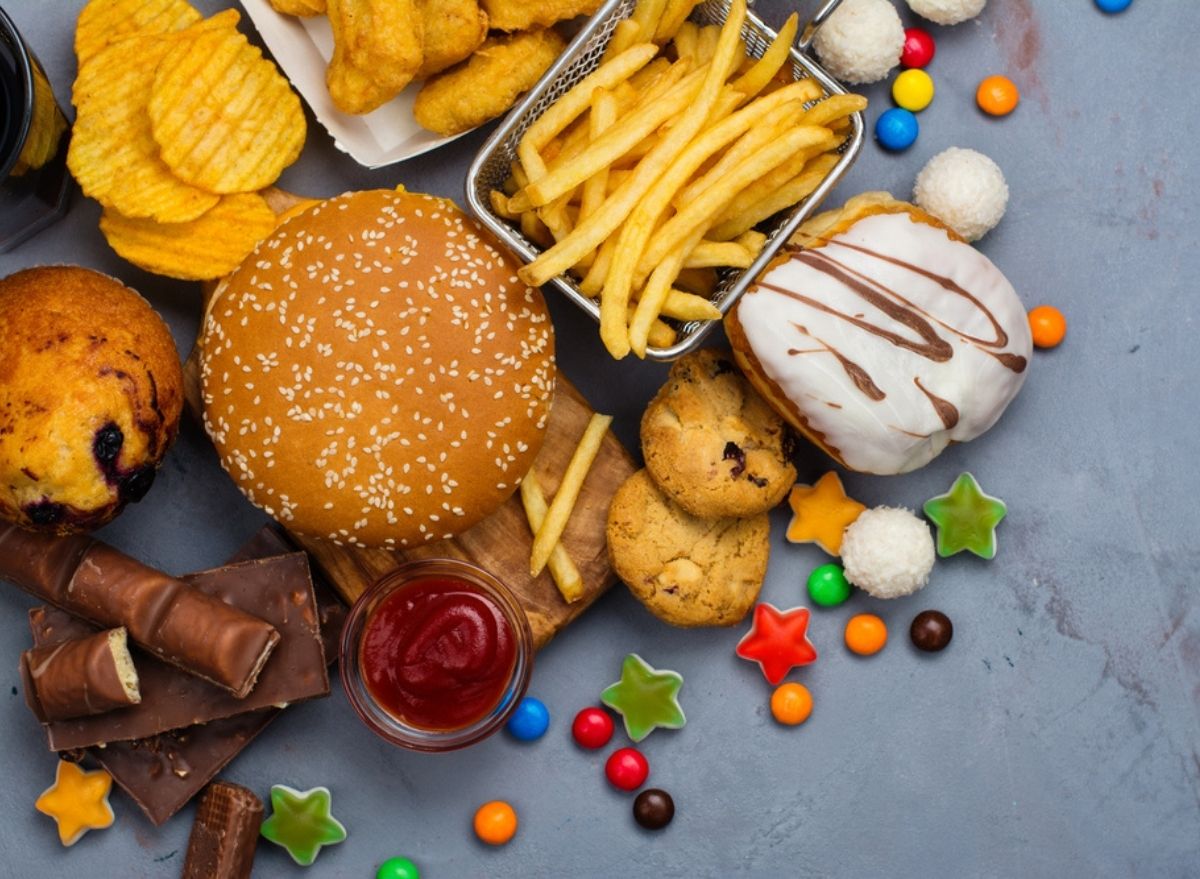
In a country where most of the food we buy at the store contains ingredients we can’t pronounce or use labeling practices meant to confuse us, it can sometimes be impossible to fully understand exactly what type of product we are putting on our plate at every meal. Not only can this feel defeating, but it can also feel frustrating to know that many American foods are banned in other countries, meaning that other parts of the globe recognize that some ingredients just shouldn’t belong in food.
Preservatives and additives are commonly used by manufacturing companies as a way to keep food fresh for longer periods of time so they can sit on the shelf without going bad. In some ways, this benefits the consumer because shelf-stable foods are often more affordable and can keep you from wasting food or money. But sadly, some preservatives have been found to have potentially harmful effects on your health.
When it comes to these more harmful preservatives, there seems to be a disconnect between the U.S. and other countries. In fact, there are a handful of American food products that are banned in other countries but are still deemed “safe” by the FDA here in the states. To investigate this disconnect a bit more, we’ve put together a list of these products that have been banned abroad but are still alive and well in U.S. grocery stores.
Citrus sodas
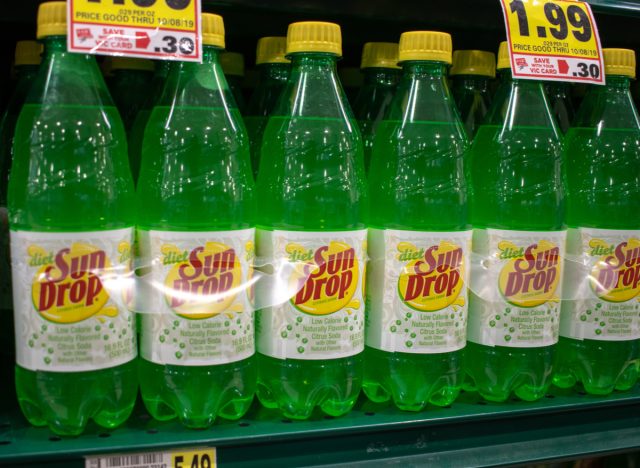
Before you reach for a bright yellow soda like Sun Drop, you may want to check the ingredients label. Even though you can probably already guess that it will be full of things like sugar and artificial flavorings, what you may not expect is that some common citrus sodas contain brominated vegetable oil (BVO).
Mayo Clinic states that this additive is sometimes used in citrus-flavored processed foods as a way of keeping the citrus from separating from the rest of the product. So yes, it is nice to have a consistently bubbly drink without any unbalanced flavors or textures, but what isn’t nice is the potential side effects. Mayo Clinic also adds that bromine is the key ingredient in BVO, and this ingredient has been linked to irritated skin, loss of memory, and headaches.
According to the Center for Science in the Public Interest, PepsiCo and Coca-Cola have agreed to remove BVO from their products, but you’ll still find it in Sun Drop. Even though you can still find drinks with brominated vegetable oil in the U.S., it has been banned from the European Union and Japan.
Certain breakfast cereals
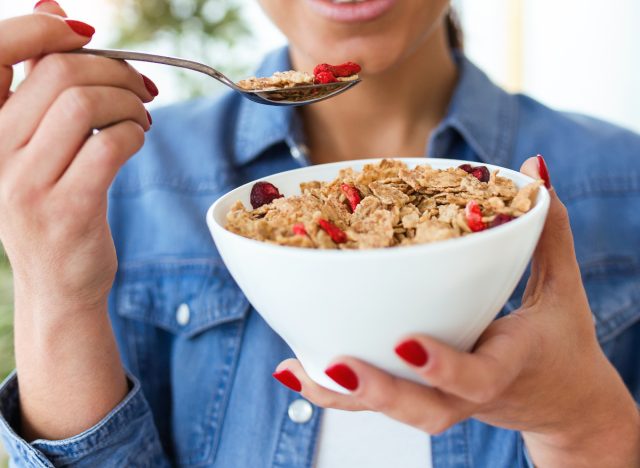
Those who enjoy a sweet start to their day can appreciate cereal as a quick, affordable, deliciously comforting choice for breakfast. While plenty of companies are making healthy cereals that use natural ingredients and keep their sugar counts low, some cereals in the U.S. still come with potentially harmful additives. For instance, butylated hydroxytoluene (or BHT) is an additive used in some cereal products—like Honey Bunches of Oats or Honey Maid S’mores—to preserve the shelf life of the product.
Even though the FDA still says BHT is safe, some animal studies have shown BHT to have carcinogenic effects, as well as a link to kidney and thyroid problems. This is why countries like Japan and the EU have reportedly banned this preservative.
Skittles
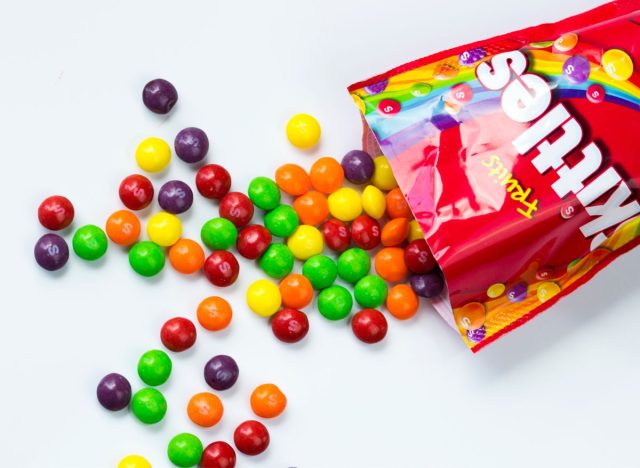
Whether you eat Skittles for a nostalgic treat or give a bag to your kids from time to time, you are consuming a few additives that are banned in multiple countries abroad. Skittles contain yellow 5 and yellow 6, both of which are artificial food dyes found to potentially have negative side effects. Some studies found a positive relationship between yellow 5 and hyperactivity in children, while rat studies of yellow 6 found possible connections to testicular and adrenal tumors.
Yellow 5 and yellow 6 have been fully banned in a few European countries, and all of the EU requires food brands to state whether or not they use these dyes on their product labels.
Milk with certain growth hormones
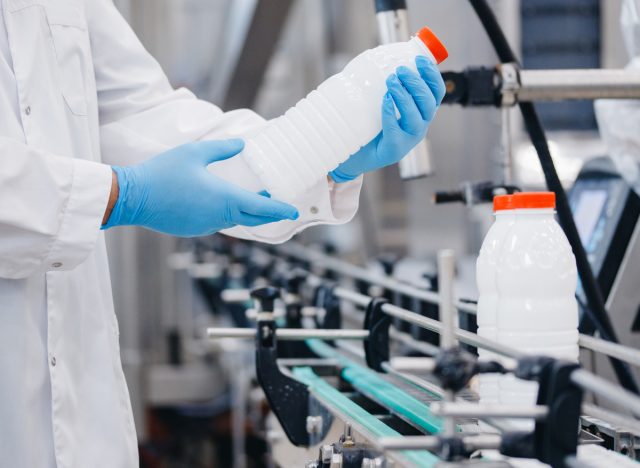
Cow’s milk can be a great way for people to get a boost of protein and calcium, but some milk in the U.S. contains a concerning hormone called rBGH (the recombinant bovine growth hormone). According to the American Cancer Society, rBGH is a manmade product meant to increase how much milk cows produce. While it is still allowed in the U.S., the USDA says that only about 9.7% of dairy companies are using it. This growth hormone is fully banned in the EU and Canada.
Some processed bread products

How would you feel after learning that some of your favorite bread products contain the same ingredient found in yoga mats and rubber shoe soles? Unfortunately, some U.S.-based foods like Jimmy Dean Delights Turkey Sausage, Egg & Cheese Honey Wheat Flatbread Sandwiches and Arby’s croissants use a whitening agent called azodicarbonamide (ADA), which can also be found in your favorite yoga mat or in the bottom of your shoes.
Although still approved by the FDA, ADA has been banned in Europe, and the World Health Organization says that ADA has been linked to skin irritation and respiratory problems in people who were exposed to large amounts of this chemical, such as factory workers.
Instant mashed potatoes
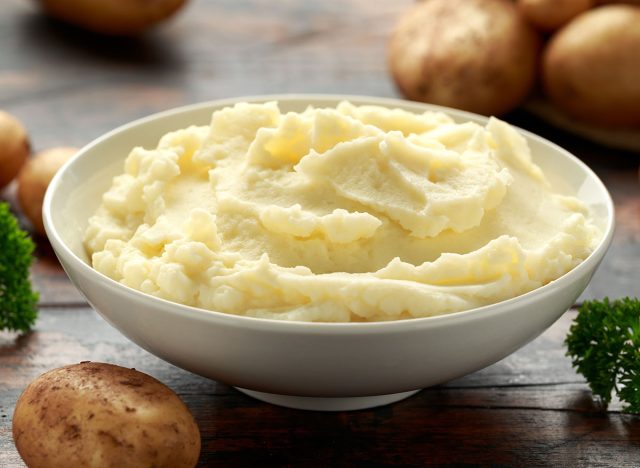
Instant mashed potatoes make a warm comfort meal easy when you don’t have the time or energy to cook. But some instant products like Hungry Jack’s Mashed Potatoes contain a preservative that may be linked to carcinogenic effects.
Butylated hydroxyanisole (BHA) is an additive that keeps the fat in certain food products from going bad on the shelf. While it may keep your shelf-stable foods good, the Environmental Working Group (EWG) says that BHA may be a carcinogen to humans. Although BHA is still used in some U.S. foods, it’s reportedly banned in the UK and Japan.
U.S. pork

Have you ever looked at the meat for sale at your local grocery store and been shocked at how large the cuts of meat look? This is often because of growth hormones used in farming practices in the U.S. as a way to grow animals at a quicker rate.
A common growth hormone used in pigs—called ractopamine—has been banned by many countries. In fact, the U.S. is one of the few remaining places to allow this hormone in their farming productions.
Even though the research is limited on the human side effects of consuming ractopamine, there are some studies that have found a potential connection between this growth hormone and elevated heart rate.
Many packaged breads, rolls, & buns
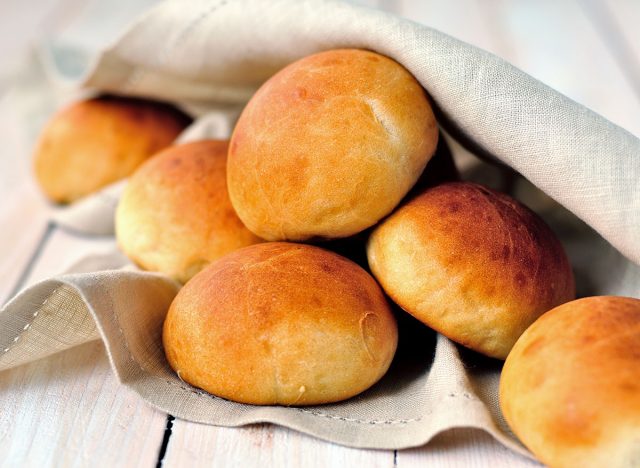
Heading to the store to buy your favorite bread products is quick and convenient, especially if they’re full of preservatives to help them stay fresh longer. Unfortunately, some of these products—86, to be exact, according to the EWG—contain an additive called potassium bromate, which has been banned in the UK, Brazil, and Canada.
Although this preservative can help keep your favorite bread products from going bad too quickly, several animal studies have found that potassium bromate has tumor-causing and carcinogenic effects.
- Source: https://www.cspinet.org/article/brominated-vegetable-oil-bvo
- Source: https://www.accessdata.fda.gov/scripts/cdrh/cfdocs/cfcfr/cfrsearch.cfm?fr=172.115
- Source: https://hpvchemicals.oecd.org/UI/handler.axd?id=6d30349e-ef9f-496c-a2af-6d497d4f1cca
- Source: https://www.ncbi.nlm.nih.gov/pmc/articles/PMC3441937/pdf/13311_2012_Article_133.pdf
- Source: https://www.cspinet.org/sites/default/files/attachment/food-dyes-rainbow-of-risks.pdf
- Source: https://www.cancer.org/healthy/cancer-causes/chemicals/recombinant-bovine-growth-hormone.html
- Source: https://www.fda.gov/food/food-additives-petitions/azodicarbonamide-ada-frequently-asked-questions#basis
- Source: https://apps.who.int/iris/bitstream/handle/10665/42200/9241530162.pdf
- Source: https://www.ewg.org/skindeep/ingredients/700740-BHA/
- Source: https://www.centerforfoodsafety.org/files/ractopamine_factsheet_02211.pdf
- Source: https://www.centerforfoodsafety.org/files/ractopamine_factsheet_02211.pdf
- Source: https://www.ewg.org/research/potassium-bromate#list
- Source: https://www.ewg.org/news-insights/news/2022/05/cancer-causing-chemical-may-be-lurking-your-bread
- Source: https://pubmed.ncbi.nlm.nih.gov/9789944/